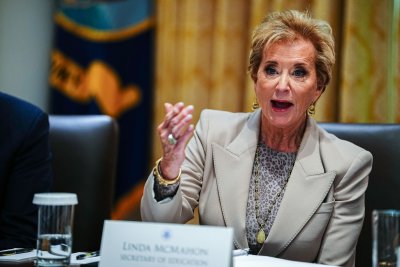Oct. 21 (UPI) — Seven major universities have rejected a request by the Trump administration to sign a pact that would limit some academic freedom in exchange for prioritizing federal research funding. One school, the University of Texas, said it would be open to signing the proposal, while another, Vanderbilt University, expressed reservations.
President Donald Trump and the Department of Education gave the universities until Monday to provide feedback on the proposal, with the goal of having a signed pact by Nov. 21. As of Monday night, the University of Arizona was the most recent institution to publicly reject the proposal.
University of Arizona President Suresh Garimella stated that the school had already implemented some of the ideas outlined by the Trump administration. The university submitted what it described as a statement of principles in response, in the form of an open letter published on the school’s website.
Garimella said, “While the University of Arizona shares some of the same ideas as the administration, a federal research funding system based on anything other than merit would weaken the world’s preeminent engine for innovation, advancement of technology, and solutions to many of our nation’s most profound challenges.”
He added, “We seek no special treatment and believe in our ability to compete for federally funded research strictly on merit.”
Other schools that received the proposal but publicly rejected it included Dartmouth College, the University of Pennsylvania, the University of Southern California, the Massachusetts Institute of Technology, Brown University, and the University of Virginia.
In addition to proposing that academic freedom would not be guaranteed, the Trump administration’s proposal—issued earlier this month—would require colleges to freeze tuition for five years, limit enrollment of international students to 15%, and enforce strict gender definitions.
Furthermore, schools would be required to post the earnings of graduates with certain degrees and expand options for service members. The governance structures of these schools would also have to include measures to ban anything that would “punish, belittle, and even spark violence against conservative ideas.”
Finally, institutions with an endowment of more than $2 billion would be prohibited from charging tuition to students entering a hard sciences program.
The University of Texas at Austin was one of the first schools to respond to the pact proposal. On the same day the Trump administration reached out to the schools, Kevin P. Eltife, chairman of the UT Board of Regents, said the university was honored to be among the nine chosen for the potential funding advantages.
“We enthusiastically look forward to engaging with university officials and reviewing the compact immediately,” Eltife said in a statement.
Meanwhile, Vanderbilt University Chancellor Daniel Diermeier sent an email to the university community stating that the school provided feedback to the Trump administration but did not outright reject or accept the pact, according to The Vanderbilt Hustler student newspaper.
“We look forward to continuing the conversation—on our campus and with leaders in government and higher education—as we work toward our shared goal of restoring public trust in higher education and ensuring that America’s universities remain the best in the world,” Diermeier said in the email.
https://www.upi.com/Top_News/US/2025/10/21/universities-Trump-pact/1271761047418/


